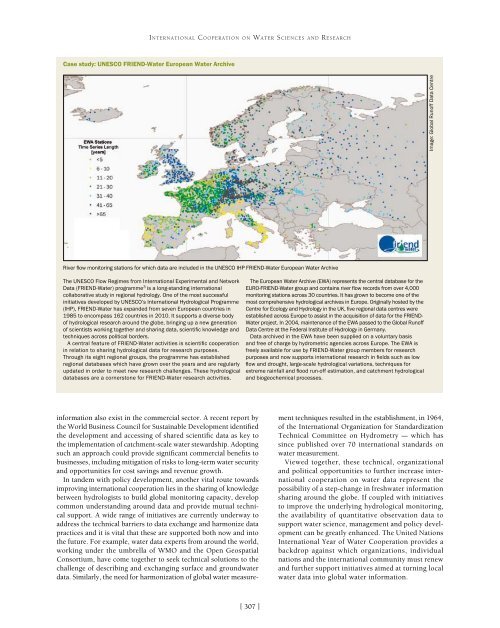222893e
222893e
222893e
You also want an ePaper? Increase the reach of your titles
YUMPU automatically turns print PDFs into web optimized ePapers that Google loves.
INTERNATIONAL COOPERATION ON WATER SCIENCES AND RESEARCHCase study: UNESCO FRIEND-Water European Water ArchiveImage: Global Runoff Data CentreRiver flow monitoring stations for which data are included in the UNESCO IHP FRIEND-Water European Water ArchiveThe UNESCO Flow Regimes from International Experimental and NetworkData (FRIEND-Water) programme 3 is a long-standing internationalcollaborative study in regional hydrology. One of the most successfulinitiatives developed by UNESCO’s International Hydrological Programme(IHP), FRIEND-Water has expanded from seven European countries in1985 to encompass 162 countries in 2010. It supports a diverse bodyof hydrological research around the globe, bringing up a new generationof scientists working together and sharing data, scientific knowledge andtechniques across political borders.A central feature of FRIEND-Water activities is scientific cooperationin relation to sharing hydrological data for research purposes.Through its eight regional groups, the programme has establishedregional databases which have grown over the years and are regularlyupdated in order to meet new research challenges. These hydrologicaldatabases are a cornerstone for FRIEND-Water research activities.The European Water Archive (EWA) represents the central database for theEURO-FRIEND-Water group and contains river flow records from over 4,000monitoring stations across 30 countries. It has grown to become one of themost comprehensive hydrological archives in Europe. Originally hosted by theCentre for Ecology and Hydrology in the UK, five regional data centres wereestablished across Europe to assist in the acquisition of data for the FRIEND-Water project. In 2004, maintenance of the EWA passed to the Global RunoffData Centre at the Federal Institute of Hydrology in Germany.Data archived in the EWA have been supplied on a voluntary basisand free of charge by hydrometric agencies across Europe. The EWA isfreely available for use by FRIEND-Water group members for researchpurposes and now supports international research in fields such as lowflow and drought, large-scale hydrological variations, techniques forextreme rainfall and flood run-off estimation, and catchment hydrologicaland biogeochemical processes.information also exist in the commercial sector. A recent report bythe World Business Council for Sustainable Development identifiedthe development and accessing of shared scientific data as key tothe implementation of catchment-scale water stewardship. Adoptingsuch an approach could provide significant commercial benefits tobusinesses, including mitigation of risks to long-term water securityand opportunities for cost savings and revenue growth.In tandem with policy development, another vital route towardsimproving international cooperation lies in the sharing of knowledgebetween hydrologists to build global monitoring capacity, developcommon understanding around data and provide mutual technicalsupport. A wide range of initiatives are currently underway toaddress the technical barriers to data exchange and harmonize datapractices and it is vital that these are supported both now and intothe future. For example, water data experts from around the world,working under the umbrella of WMO and the Open GeospatialConsortium, have come together to seek technical solutions to thechallenge of describing and exchanging surface and groundwaterdata. Similarly, the need for harmonization of global water measure-ment techniques resulted in the establishment, in 1964,of the International Organization for StandardizationTechnical Committee on Hydrometry – which hassince published over 70 international standards onwater measurement.Viewed together, these technical, organizationaland political opportunities to further increase internationalcooperation on water data represent thepossibility of a step-change in freshwater informationsharing around the globe. If coupled with initiativesto improve the underlying hydrological monitoring,the availability of quantitative observation data tosupport water science, management and policy developmentcan be greatly enhanced. The United NationsInternational Year of Water Cooperation provides abackdrop against which organizations, individualnations and the international community must renewand further support initiatives aimed at turning localwater data into global water information.[ 307 ]


